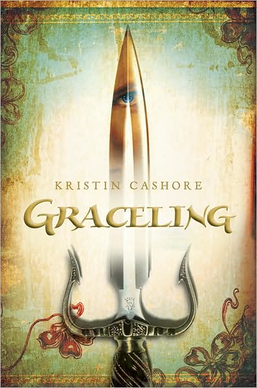Saturday, 18 October 2014
Mother/Daughter Book Club: Graceling Realm series
For several years I was involved in moderating Book Clubs for 11-13 year-olds. Initially, the idea of the Book Club was purely academic; a small group of mothers wanted their children to be reading more extensively as they prepared for scholarship exams. Over time the Book Club concept evolved into a more general idea of enrichment, and what I learned was that the children seemed to benefit the most if their mothers read alongside them.
How do you encourage lifelong reading habits in your children?
Reading research and my own experience (as both teacher and mother) would recommend three broad strategies. First, read to your children; second, let them observe you reading regularly; third, read alongside them. There's no great secret or trick -- just perseverance. Of course, it does help if you have a sincere love of reading!
So many adolescents fall out of the habit of pleasure reading, but parents can really make the difference. This August, the Financial Times ran an article about the growing popularity (and sales figures) of young adult literature. Gillian Tett, the author, pointed out that "as this young adult literature becomes more subtle and multifaceted, the boundaries between 'adults' and 'teen' literature are collapsing as well". Tett concluded her article by suggesting that reading young adult literature together might even "help some parents and teens to connect with each other a little better this summer".
My 16 year-old daughter and I read many books "alongside" each other this summer, but absolutely hands-down our mutual favourite was Kristen Cashore's Graceling Realm series. This fantasy trilogy is widely appreciated by American readers, and regularly makes "best" and "favourite" lists, but it truly deserves a wider UK reading audience. Beautifully written, original and brave, this series puts young women at the centre of the story in a way that is rare. The three novels -- Graceling, Fire and Bitterblue all feature a female protagonist. (The books are separate stories, but cleverly interconnected. Unlike most trilogies, you do not have to read all three to get plot resolution and emotional pay-off.)
Of course, there are many books in which a young woman is the main character, and perhaps the difference is only subtle, but these female characters are in command of their own destinies. They have extraordinary physical strength (Katsa in Graceling), mental strength (Fire) and emotional strength (Bitterblue), but what they all share is a particular toughness that enables them to make difficult decisions -- but not without a cost. These books send the message that growing into your own powers isn't easy, and that no one should expect it to be.
Although the novels are set within a fantasy world, there are no fairy tale conventions of "love at first sight" and "happily ever after" in these emotionally realistic stories. The protagonists experience real, complicated love that grows (usually not smoothly) out of friendship and mutual respect. If that sounds a bit dull, it's really, really not. Quite unusually for fantasy, or indeed any other young adult literature, these novels also have a sophisticated, realistic attitude to sexuality -- including the practical matter of birth control.
But really, love and partnership are just one aspect of these stories -- not the be-all, and certainly not the end-all. These three women are all leaders, and they must make complicated decisions that are not without personal sacrifice. Without giving too much of the plot away, this fantasy series strongly suggests -- and yes, the idea still feels slightly revolutionary -- that women's destinies may include options other than being a wife and/or mother. And that is by not choice, not default.
I feel sure that I am not the only mother who worries about the constant barrage of mixed messages that our daughters are exposed to, particularly through social media. It's a narcissistic, selfie-driven age, and it often seems like physical appearance and "presentation" are what really matters. There is social pressure to not be too smart or too strong. It can be so difficult to talk openly to our daughters, but reading books together can be an important way of getting a message across, encouraging debate -- of even just having a conversation.
Graceling featured on TRAC's recently published "fantasy" list for recommended reading. Visit the TRAC website or this link for the full list.
Subscribe to:
Post Comments (Atom)


No comments:
Post a Comment